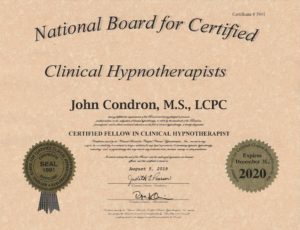
I am not just a “hypnotherapist!”
 Anyone can call himself a “hypnotherapist.” There are absolutely no requirements for licensure; in fact, no state in the US licenses hypnotherapists! I am a Licensed Clinical Professional Counselor and Master Addiction Counselor with many years of experience working with people with a wide range of mental health issues. A Fellow of the National Board for Certified Clinical Hypnotherapists, I use hypnosis as a powerful component of psychotherapy but I do not limit my options as a therapist to hypnotherapy alone.
Anyone can call himself a “hypnotherapist.” There are absolutely no requirements for licensure; in fact, no state in the US licenses hypnotherapists! I am a Licensed Clinical Professional Counselor and Master Addiction Counselor with many years of experience working with people with a wide range of mental health issues. A Fellow of the National Board for Certified Clinical Hypnotherapists, I use hypnosis as a powerful component of psychotherapy but I do not limit my options as a therapist to hypnotherapy alone.
I find that hypnosis can be a powerful tool for changing thoughts, emotions and behavior, but it is just one of many approaches available for the treatment of Anxiety, Depression, Posttraumatic Stress Disorder, Chronic Pain, Insomnia, Addictions, and a host of other problems.
My advanced mental health training enables me to differentiate conditions that can be safely and effectively treated using hypnosis alone from those requiring a more comprehensive treatment approach. There is a risk that the “lay hypnotherapist,” lacking such advanced mental health training, could do significant harm.
Hypnotherapy Training
My initial training in hypnosis dates back to the early 1980s, when I was in a masters degree program in Pastoral Counseling at LaSalle University in Philadelphia. Since then, I have practiced hypnotic psychotherapy in many settings, including hospitals, drug treatment centers, and the community,. Much of this experience has been supervised or in collaboration with highly experienced Psychiatrists, Psychologists and Hypnotherapists.
My most comprehensive training in Hypnotic Psychotherapy was in the form of a Mastery Training Course in Ericksonian Approaches to Brief Hypnotic Psychotherapy, conducted by Jeffrey Zeig, Ph.D., Founder and Director of the Milton H. Erickson Foundation, with Brent Geary, Ph.D., Lilian Borges, MA, LPC, and Stephen Lankton, MSW, DAHB.
I constantly seek additional training; most recently, I completed 50 hours of training in direct suggestion and parts work, conducted by Rick Boyes, Ph.D.,, a professor at Northwest Nazarene University and Executive Director of the National Association for Clinical Hypnotherapy.
Caveat Emptor: Let the Buyer Beware
The practice of hypnosis is not regulated by the state of Idaho or most other states. That means anyone can put a sign in the window and call himself a “Hypnotherapist.” There may be a pretty certificate on the wall, but that proves nothing. See the Hypnosis Myths and Facts page for more information on certification.
I am a Licensed Clinical Professional Counselor and Master Addictions Counselor. with advanced training in hypnosis and a variety of other evidence-based treatment approaches. That represents a high level of training, including a Masters Degree and thousands of hours of experience, as well as adherence to several different professional Codes of Conduct. My practice is regulated by the Idaho Bureau of Occupational Licensure and the National Board for Certified Counselors (NBCC).